
A detailed look at knife edge angles

To understand sharpness you must first understand the definition of an edge. An edge is the line of intersection of two surfaces. A highly sharpened edge is one where the two surfaces are highly polished to form a very fine edge. Sharpening is the means to that very fine edge.
There are countless ways of testing knives and tools for sharpness. We believe the easiest way to test sharpness is to use the tool or knife. If it does not cut fast and cleanly, it needs sharpening. On a kitchen knife, the knife should be able to cut vegetables with almost no downward pressure. On a woodworking tool, the tool should cut wood fibers cleanly without leaving marks or crushing the wood fibers. On a fillet or skinning knife, it should be able to cut very quickly without having to saw through the meat.
If you really want to get down to fine-tuned levels of sharpness there are a few more tests you can use. My personal favorite is to take a piece of paper and hold it vertically. If you try to cut it with a dull knife, the paper will crumple beneath the knife. A sharp knife will cut it cleanly when use a slicing motion to cut through the paper. A razor sharp knife can cut the paper cleanly by just pressing down on the edge of paper without any slicing at all.
Another test is to shave the hair on your arms. While we recommend caution using this method, it can be very useful. A dull or even moderately sharp knife will just fold over your arm hairs without cutting. A well sharpened knife will cut almost all of the hairs in one pass. A very sharp knife will cut all the hairs in its path. This level of sharpness can only be attained using the finest abrasive materials.
Another factor effecting edge sharpness is the angle it is sharpened. The lower the angle, the sharper the blade becomes. However, the lower the angle, the weaker the edge becomes. Very low angle blades like a razor blade or a fillet knife will ultimately have a sharper edge than high angle tools such as an axe.
Under 10 Degree Angles
The lowest angles are reserved for edges that are typically cutting softer materials. In this case, the edges are not subject to abuse so the lower angle can be maintained without damage or edge failure. The lowest angles that we typically see are on straight edge razors. These are sharpened to an angle which is roughly 7 to 8 degrees (although the back of the blade is used as a guide so knowing the angle isn’t important and it is not adjustable). A straight razor has a very delicate edge that is very easy to damage. In proper usage, a straight razor would never see the type of use that would damage the edge.
10 to 17 Degrees Angles
A sharpening angle of 10 to 17 degrees is still quite low for most knives. With a total angle of 20 to 34 degrees, this is still a very fine edge. This edge is typically too weak for any knife that might be used in any type of chopping motion. Also consider that harder steels are also more susceptible to impact damage because they are more brittle. If your knife is used for cutting soft items or slicing meats, this lower angle can hold up and provide a very smooth cutting action.
17 to 22 Degree Angles
A 17 to 20 degree angle covers most kitchen knives. Some knives (typically Japanese manufacturers) will sharpen their knives to roughly 17 degrees. Most western knives are roughly 20 degrees. It is our experience that kitchen knives sharpened to 15 to 20 degrees cut very well and are still durable. These angles are still not highly durable as a total angle under 40 degrees will not respond well to rougher treatment in harder materials.
22 to 30 Degree Angles
In this range, the knife edges are considerably more durable. A pocket knife or a hunting knife will inevitably see abuse not seen by knives meant primarily for slicing or chopping softer materials. While the edge may not ultimately cut as well (but you may not notice a difference) it will be considerably more durable.
Over 30 Degrees Angles
Any edged tool or knife that is sharpened past 30 degrees will be very durable. Its cutting ability will be noticeably reduced. This durability has an advantage because more force can be used to make the cut. While the majority of knives won’t benefit from this sharpening angle, an edged tool like a machete, cleaver or axe must be durable as the typical cutting action of these tools would damage other edges.
http://www.sharpeningsupplies.com/Detailed-Discussion-on-Knife-Sharpening-Angles-W28.aspx
http://lifehacker.com/5978582/sharpen-knives-with-a-whetstone-to-keep-your-blades-in-top-condition

|
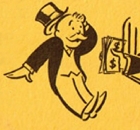

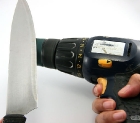
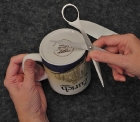
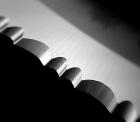

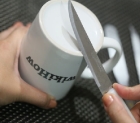


An average straightforward knife sharpening runs $10-15. If the knife is particularly large or dinged up on the edge it will pasrobably cost $15 or more, especially if it is badly damaged.
Sharpening more knives than one at a time saves money, and sharpening full sets can save even more. Small knives in good condition as part of a set can be sharpened for as low as $5.
Of course we always give you an accurate estimate of what your sharpening is going to cost before we start.
So let's get started.